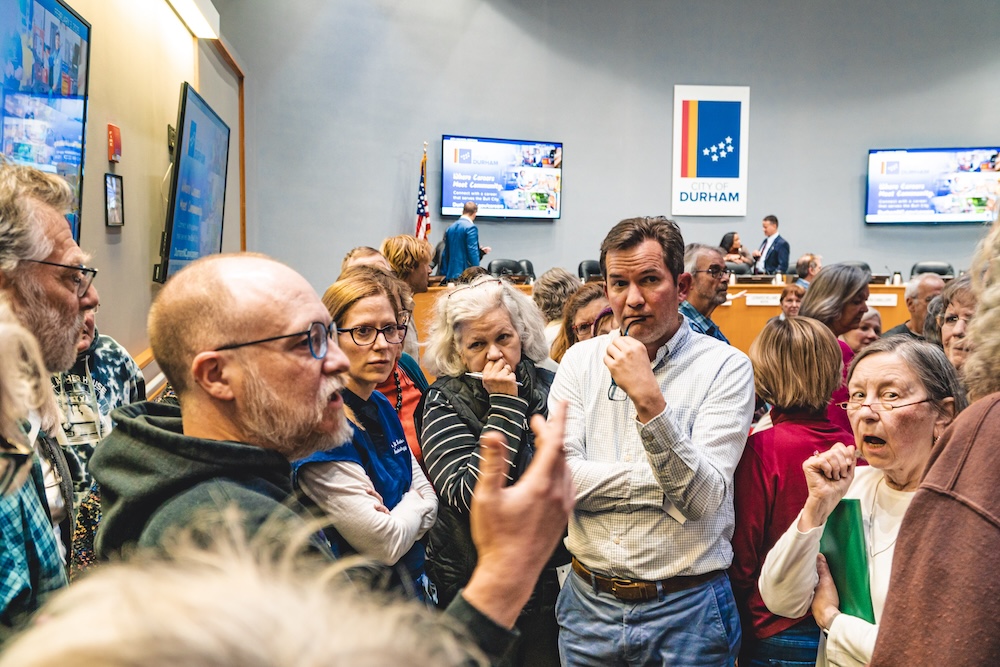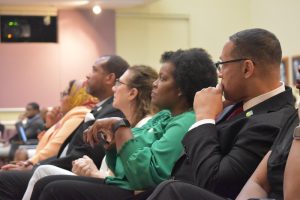High school senior Angus Cook arrived at Monday night’s City Council meeting with a carefully rehearsed three-minute speech. Minutes before taking the podium, he found himself scratching it out in a corner.
Two contentious zoning issues had turned the council meeting chambers around him into a hubbub of dissent. Twenty-nine retired educators, young parents, nature enthusiasts and students squished together on the left side of the room, organizing their opposition to a proposed rezoning on Pickett Road. Thirty-seven stood on the other, hoping to present a united front against a Moriah Ridge annexation proposal.
Cook stood on the fringes of the first crowd, scrawling over his printed statement with a pencil. His classmate Evan Register clutched her own wrinkled speech. Their frantic editing efforts went unrewarded when the City Council left the Pickett Road matter unresolved nearly three hours later.
Council members instead postponed their vote on the issue until the March 17 council meeting. If the measure passes, it will rezone 6.12 acres to allow the construction of 140 apartments.

On Monday, some residents raised grievances about how the project would affect traffic and parking overflow, given the congestion already present during school pick-up and drop-off at nearby Durham Academy Upper School. Others feared the ecological destruction of Sandy Creek Park, especially considering its floodplain location and migratory bird populations. All had prepared to take advantage of the three-minute time slots typically offered to Durham residents during public hearings.
But faced with a packed house, two controversial issues and 89 registered speakers, Mayor Leonardo Williams clipped each time slot down to just one minute.
“If we were to have everyone speak for three minutes, then we would be here all night,” he said.
Williams suggested that residents confer and attempt to organize before speaking.
“What I’m seeing is that for each of these cases, every signup is the same — that’s opponent. I’m gonna make an assumption that you all know each other,” Williams said to the crowd.
A hearty chorus of “nos” and “we don’t” rang out through the room.
He stumbled before rephrasing his suggestion.
“This is a community, so we can work together to try to figure out how to get our point across without having to be here until tomorrow morning,” Williams said.
Residents shuffled and murmured in their seats as the mayor encouraged opponents to nominate a spokesperson, or to cede time to one another. Instead, they huddled during the recess, ultimately deciding to edit down their statements and retain individual opportunities to address the council.
Sonja Williams, a former park ranger, environmental educator and federal compliance monitor for the state of North Carolina, ambled to the front of the room with a knitted teal-and-yellow beanie atop her head.
“I discovered Sandy Creek Park by accident, and I was amazed,” Williams said. “I’ve been an environmental educator most of my adult life, and it is a true gem. The value of this place as an educational opportunity for our children is immense … I please ask that you say that we do not need four-story apartment buildings near it. Decals in windows will not prevent birds from hitting the buildings.”
Williams never got to add her comments about the park’s biodiversity or status as a wetland, though she discussed both before the meeting as she waited in line to speak.
Two young brothers also stepped up to the podium. Merritt Schulz, the chair of the student sustainability committee at Durham Academy, expressed his hope that the council would preserve Sandy Creek Park for future generations. His little brother Ian talked about the brothers’ shared memories exploring the park’s woods during an isolating pandemic.
“Our bikes became our lifeline, and Sandy Creek became our haven,” the younger Schulz said.
As the brothers filed back into their seats, with matching blue sweaters and blonde hair, their mother gave each a gentle squeeze on the shoulder.
Opposing statements continued for nearly an hour. A representative from the New Hope Bird Alliance reminded the council that Sandy Creek Park is one of the only ADA-accessible parks in Durham. Flooding from construction could deprive wheelchair users of a vital green space, she said. The father of a six-month-old held back tears, explaining that he wanted his daughter to learn to ride her bike in Sandy Creek. Cook and Register brought up the safety issues their cross-country team might face from increased traffic near Durham Academy.
“We’ve had strangers coming up to girls, following them and making them uncomfortable as they walk through our campus. The addition of many more residents is going to be a safety issue for all of us,” Register said.
When the public hearing finally concluded, council members did little to reassure the residents. Though they expressed interest in having the developer work towards more bird-friendly features and lighting compliance, they shrugged off other concerns.
“I heard one of the comments tonight that they were concerned about strangers walking on school grounds and through the park,” said Mayor Pro-Tempore Mark-Anthony Middleton. “Which is kind of funny, because if you don’t know each other now, how do you identify a stranger?”
Council members also repeatedly hinted at the inevitable development of the Pickett area, whether through this proposal or another down the line.
“What part of our city is exempt from the growth we are going through?” Middleton asked. “I’m a fairly influential person in the city, and I could not exempt my own neighborhood from the changes and the pressures of growth.”
The council ultimately postponed the issue with instructions to the developer to explore additional green infrastructure features, create a connection to the Sandy Creek Trail and work more closely with Durham Academy.
Residents filed out of the chambers around 10:30 p.m., their crumpled statements in hand. Many — Cook included — had begun mentally drafting another iteration of speeches for March.
Above: Residents huddle in a corner to refine and trim their arguments during recess at a busy City Council meeting Monday. Photo by All Kibria — The 9th Street Journal




